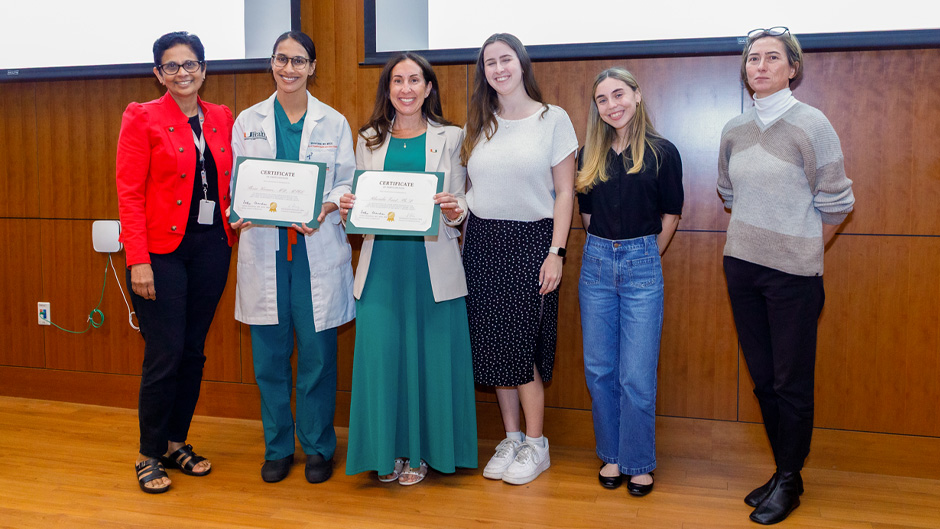School of Communication lecturer Rhonda Trust will work next to Dr. Shria Kumar, a gastroenterologist at the Miller School of Medicine, to develop a media campaign promoting H. pylori screenings, a test that detects a bacterium that can infect the stomach and cause ulcers and other digestive issues.
The community-centered project is a unique, innovative collaboration between the School of Communication and the Miller School that melds medical knowledge with communications skills to help the community.
For the next two years, this initiative will be funded by the Mitchell Wolfson Sr. Foundation Health Communication Grants, which allows for collaboration and interdisciplinary initiatives between the two schools. The project also involves at least one graduate student from either school.
“We are immensely grateful to Jeri Wolfson, for having the initiative to invite our communication school to collaborate with the Miller School of Medicine,” said Karin Wilkins, dean of the School of Communication. “Together our collective work benefits patient experience, health professional education, and essential research.”
She added: “health communication is central to our school mission, to leverage our expertise and scholarship for social impact, contributing to healthy behaviors and outcomes, constructive health care interactions, and exceptional educational experiences.”
On March 3, 2025, the foundation announced the three winners of the 2025 grant proposals after a three-hour presentation at the Medical Campus before a panel of judges from the medical and communication schools.
“Receiving this grant allows me to collaborate with an M.D. on a social media campaign promoting H. pylori screenings, an initiative that directly aligns with the School of Communication’s health communication mission,” said Trust. “This project is community-centered, aiming to make a meaningful impact within Greater Miami through targeted outreach and education.”
Konstantia Kontaxis, associate dean for research and creative activity, said that: “these grants have been crucial in strengthening the school’s role in health communication while fostering a robust partnership with the Miller School of Medicine. They support innovative educational interventions that advance health communication strategies, benefiting both our academic community and the wider public.”
“Health communication is a crucial area for the School of Communication since it integrates medical science, public health, and strategic messaging,” said Kontaxis. Courses offered by the school include a Survey of Health Communication, Culture and Health and Communications and Health Communication Interventions.
“Our curriculum emphasizes real-world applications, such as public health campaigns, misinformation correction, and behavior change communication,” she said. “These grants have allowed us to further develop and implement these strategies, making a meaningful impact on public health.”
Crucial to fostering the relationship and essential in shaping this collaboration between the School of Communication and the Miller School were Dr. Latha Chandran, executive dean for education and policy and founding chair of the Department of Medical Education; and Rose Maria van Zuilen, associate director of the Academy of Medical Education Scholars in the Department of Medical Education.
Trust believes that the projects greatly benefit from the collaboration between the two disciplines.
“Working alongside a physician enhances the study by integrating clinical expertise with effective health communication messaging strategies, ensuring that our campaign is both medically accurate and culturally relevant,” she said. “Ultimately, this partnership strengthens our ability to reach at-risk populations, encourage screenings, and promote early detection efforts in the community.”
In the past year other studies have included:
- “Obstetric Emergency Simulations: Enhancing Skills and Empowering Communities to Improve Maternal and Fetal Health Outcomes Using Immersive Technologies.,” led by Kim Grinfeder, founding chair and professor at the Department of Interactive Media, and Liviu Cojucaru, assistant professor of obstetrics, gynecology, and reproductive sciences.
- “Radioactive: Radiotherapy Patient Education with Virtual Reality” led by Benjamin James Rich, assistant professor of clinical radiation oncology, and Chen “Crystal” Chen, assistant professor of strategic communication.
- “Leveraging tailored health communication strategies to increase policymaker engagement regarding syringe services programs in Florida” by Tyler Bartholomew, assistant professor in the Division of Health Services Research and Policy, and Marina Plesons, a graduate student in the Medical Scientist Training Program (M.D./Ph.D.).
Other projects funded this year were:
- “Enhancing Early Detection of Nail Unit Malignancies: Educating Nail Technicians Through Advanced Certification and Health Communication Intervention” to be led by Brian Morrison, associate professor of dermatology and cutaneous surgery, and Nick Carcioppolo, associate professor of communication studies.
- NET-AI, an AI-informed, spatially explicit, social network-based communication model designed to increase breast cancer clinical participation among underrepresented populations, specifically Black and Latino communities, led by Mariano Kanamori, associate professor of public health at the Miller School, and Sanjeev Chatterjee, professor of cinema.

